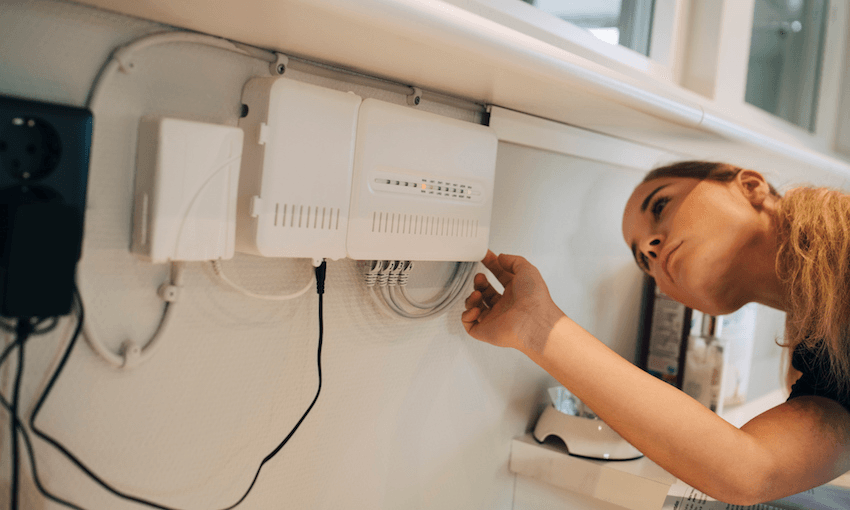From broadbeans to home wiring, the Spinoff and the Commerce Commission provide some essential tips on how to enhance your broadband performance.
The internet is buzzy as. Think about it for a second. Inexplicable technology has the answer to every question you’ve ever had, held inside magic flying around in the sky, just waiting for you to ask the right question.
New Zealanders appear to understand the deep existential importance of the immense potential of the internet and the power wielded by its gatekeepers – the internet service providers – and each year we spend about $1.2 billion on home broadband.
In fact, believe it or not, New Zealand’s internet is among the world’s fastest and cheapest.
The Commerce Commission’s annual telco monitoring report shows a “premium” 100Mbps fibre broadband service with unlimited data and a voice line is available for $90 a month. That’s 5% below the OECD average, and 24% cheaper than what you’d get in Australia. According to data distribution company Akamai, New Zealand’s average fixed broadband download speed is 14.7 Mbps, up from 10.5 Mbps. Last month it took me 2 minutes to download Ye, compared to an estimated 12 minutes to download My Beautiful Dark Twisted Fantasy in 2010. New Zealand continued to widen its speed lead over Australia on the Akamai measure, and continues to hold its spot compared to the rest of the world.
But it’s actually really difficult to get an accurate understanding of internet performance. Especially when the speed of plans being purchased and typical consumption is rising, and we all know about the dramatic unexplained variation in performance caused by things like technology, rain and the 7pm rush hour.
So the Commerce Commission is running a nationwide programme to track the performance of Kiwis’ broadband and the way it’s affected by providers, geography, and things like time of day. This will help consumers choose the best package for their household or business, and accurate information will encourage telco providers to compete transparently on performance, not just price.
To get this clearer picture, they need volunteers from across New Zealand to slap a ‘Whitebox’ (similar to a modem) onto their connection at home. This box performs automated tests on your home internet performance at different times of the day and DOES NOT record any personal information or browsing history, or interfere with your internet service.
Volunteers will also have access to their own internet performance information, which may help diagnose issues and improve their broadband performance.
Your country needs you! Enlist today.
But while we wait for the performance data to be available to incentivise ISPs to provide faster, more consistent broadband, The Spinoff and the Commerce Commission have come up with some helpful tips to ensure you’re getting the most out of your broadband. Some are more helpful than others…
The Spinoff’s helpful tips:
- Use a dehumidifier. The water in the air adds resistance and makes your wifi significantly weaker, remove it and you’re winning.
- Have a fight with your flatmate that involves them storming out of the flat. Stream UnReal in its entirety afterwards.
- Go to your router’s IP and turn it off. Wait for your flatmate to keep turning the router on and off and realise it’s not working, and then leave and go to his girlfriend’s house.
- Sell everything. Squat at work, use their internet instead when nobody’s there at night.
- Change the wifi password and pretend you don’t know what’s happened, knowing your flatmate is too socially awkward to ever ring up the provider. Continue this process until they move out.
- Complain louder. It’s the same logic that makes people move their whole body when playing video games.
- Turn your router off, then on again.
- Throw a broad bean into a well under the light of a full moon. Broad bean. Broadband. Certainly makes you think.
- Change the password so your flatmates can’t use it.
- Turn your old phone or laptop into a wifi extender.
- Browse the internet as text only. It’s fast AND ‘90s-retro-cool.
- Read a book. Run in the long grass. Stand in the middle of your street screaming at the moon. You’ll forget how rubbish your internet connection is.
- Relax. The internet is way faster than it used to me you ungrateful son of a…
- Knock down your house’s internal walls to enhance your indoor-wifi-flow.
- Call the police.
- Take a cold hard look at your microwave. It’s probably sabotaging the vibe in the air.
- Live alone so you don’t have to share your internet with anyone else and you can also wallow in your own Robin Williams in Good Will Hunting-esque filth.
- Delete Fortnite.
- Unplug the wifi to cripple your flatmates’ stream, and connect your laptop via an ethernet cable instead
- Wrap yourself in tinfoil.
- Keep an eye on the neighbours and cut off any freeloaders who are trying to steal your broadband (true story).
- Reduce the quality of the *ahem* videos you watch. Shame and self-loathing feels about the same at 240p as 1080p.
- Put your phone on your head. Not strictly broadband but helpful for internet access if you’re somewhere remote. When you need some extra bars on your phone to text your wife about what she needs from the supermarket, or to get out that essential Facebook status update from the South Sudan desert (true story), put your phone on your head. The science says this turns your body into an aerial allowing your phone to pick up more signal. The anecdotes say in the depths of Africa or Titirangi it allows you to check your emails. You might look stupid, but it definitely works. (Side note: the same theory applies to the remote on your car key remote, create extra range by holding them to your head.)
The Commerce Commission’s legit advice:
- Turn it off and on. You know it works, but did you know why? Basically it’s like any computer that over a period of time can get clogged doing its own calculations and turning it off resets it. It allows the system to restart and start afresh.
- If you are using wireless, have the router in a central location. Distance is your enemy. Keep it away from other electronic devices, because wifi uses the same radio waves as cordless phones, microwaves and baby monitors. Distance between the two things reduces the opportunity for interference.
- Make sure your signal is not being interfered with by your neighbours. The radio waves that your wireless router uses is in the same area of the spectrum as other electronics use. Because they are in the same range it can get clogged. The 2.4 GHz range is the problem as it’s a common frequency. You don’t have to pay to use it, anyone can use that spectrum. But that means it a wild west with a lot of things going on.
- Newer tech offers the 5GHz spectrum as well, and newer phones and computers will be able to use this.
- Use an ethernet cable to get better performance, although this is not always practical.
- If you’ve got a big home, use more than one wifi access point to create a mesh network across the property. It extends the coverage using some of that wifi magic and provides a much more consistent signal throughout your home.
- If the wiring at your home was done years ago for the telephone and hasn’t been upgraded that’s going to affect your performance. Sometimes a small wiring upgrade can have a big effect on the stability.
This content is brought to you by the Commerce Commission. Sign up to be a broadband volunteer at www.measuringbroadbandnewzealand.com


